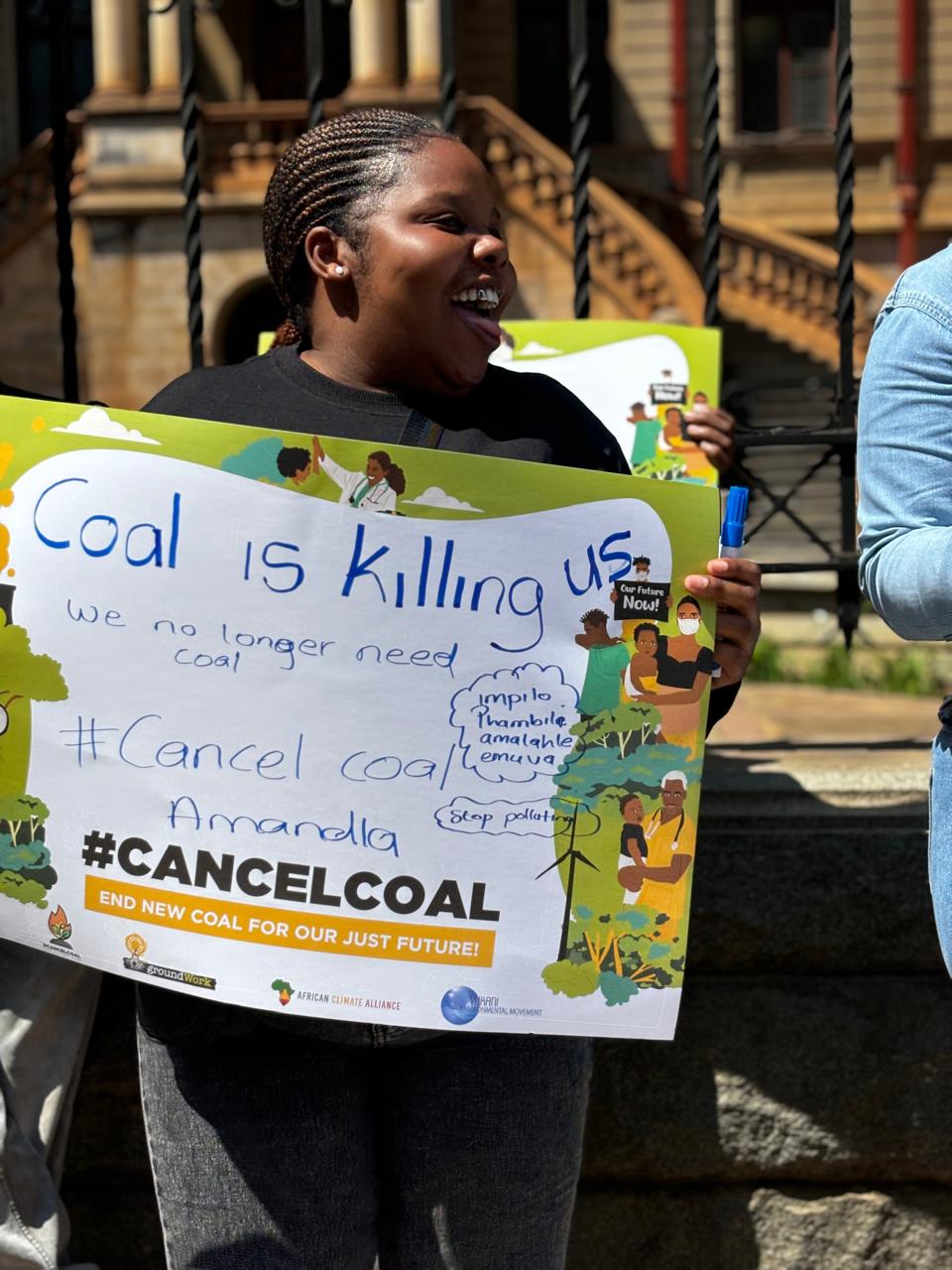Signed appointment letters and related documents reveal that the National Department of Health’s (NDoH) top official and his counterpart at the Independent Development Trust (IDT) played key roles in an allegedly unlawful project to install oxygen plants at state hospitals.
The NDoH has since written to the IDT to withdraw from the project, according to a statement issued by the IDT’s board of trustees. The board has directed the IDT’s management to accept the NDoH’s instruction. According to the statement, the IDT’s management maintained that “procurement processes were followed”.
The project, bankrolled by the Global Fund, one of the world’s largest health financiers, was initially set to cost R216-million, but the figure later ballooned to R836-million. The main contractor, Bulkeng, failed to adhere to several of the project’s original requisites yet somehow managed to secure a R428-million portion of the roll-out.
In this latest instalment in Daily Maverick and amaBhungane’s joint investigation we unpack seemingly irregular tender processes associated with the project. The IDT, a government infrastructure implementing agency, appointed Bulkeng to install pressure swing adsorption (PSA) oxygen plants at 45 government hospitals.
A joint venture (JV) between Maziya General Trading and On Site Gas Systems International clinched a R152-million contract to install plants at a further ten hospitals.
Our investigation shows that the IDT seemingly expanded the project’s scope after it took over as the NDoH’s implementing agent. By altering the quantities and the sizes of the required plants at many of the hospitals, the IDT paved the way for far costlier contracts.
An implementation plan for the project, adopted by the NDoH and the IDT in August 2022, set the budget at R216-million. This boils down to an average spend of roughly R3.61-million per hospital. The following year, however, the IDT altered the bill of quantities and the contractors were eventually appointed at an average cost of R10.5-million per site. The IDT and the NDoH have been at pains to explain how the project’s budget ballooned by nearly 300%.
We’ve established that Dr. Sandile Buthelezi, the health department’s beleaguered director-general, and the IDT’s CEO, Tebogo Malaka, played key roles in getting the contentious contracts over the finish line, despite concerns about the cost overruns.
Buthelezi reportedly already faces an investigation for allegedly soliciting a R500 000 bribe from an unrelated contractor in another IDT project. He was also suspended in 2021 over his role in the Digital Vibes scandal but later returned to work after an internal disciplinary hearing cleared him of wrongdoing.
Dr. Sandile Buthelezi, the National Department of Health’s director-general. (Photo: sourced)
We can also reveal that the IDT, ostensibly with Buthelezi’s consent, ran afoul of the 2022 implementation plan by omitting or circumventing key requirements, including those related to the bidders’ South African Health Products Regulatory Authority (SAPHRA) registration status and their gradings from the Construction Industry Development Board (CIDB).
We will also detail how the IDT apparently allowed Bulkeng to slip key documents into its bid bundle more than a year after the tender had closed.
Finally, we will highlight some of the statements the IDT and the NDoH made in relation to the project, illustrating how the IDT in particular has apparently been disseminating patently false or misleading claims.
We sent the IDT and the NDoH detailed queries regarding each matter unpacked in this piece. Both organisations vowed to respond but failed to do so before our deadline.
Instead, the IDT’s board of trustees on Monday afternoon issued its statement. The board said it “noted with serious concern” the allegations regarding the project.
“…anything that smells of malfeasance should be nipped in the bud and those found to be responsible of such, shall face consequences management”, the board’s chairperson, Adv. Kwazi Mshengu, was quoted as saying.
Vital bid requirement dropped
Documents in our possession, including Bulkeng’s company records and the IDT’s request for quotations (RFQ), point to a flawed procurement process, one that allegedly saw Bulkeng appointed at an inflated cost despite the fact that it wasn’t qualified for the project.
The procurement process, a two-pronged affair, was concluded in 2023.
First, the IDT advertised a tender to appoint contractors to a panel of would-be suppliers. More than sixty entities submitted bids, and in June last year the IDT appointed eight companies to the panel.
Next, in July 2023, the IDT issued RFQs to the panel members and eventually picked Bulkeng and the Maziya/On Site Gas JV for the roll-out.
Much of the controversy around Bulkeng’s appointment stems from its SAHPRA certification – or rather lack thereof.
In our previous reports, we detailed that Bulkeng had never been registered with SAHPRA, and that it had submitted another entity’s certificate to the IDT.
The IDT has since repeatedly claimed that a SAHPRA certificate was never a mandatory requirement for bidders, but we can now illustrate why this statement is disingenuous.
An infrastructure programme implementation plan, or IPIP, signed in August 2022 by various NDoH and IDT officials, forms the basis for the oxygen plants project.
The IPIP document very clearly states that SAHPRA certification needed to be factored into the IDT’s procurement process.
When the IDT issued its tender and RFQs, the SAHPRA requirement was somehow omitted, which would have opened the door to unqualified companies like Bulkeng.
A PSA oxygen plant (Image: Sourced)
Construction Industry Development Board
The 2022 implementation plan also called on the IDT to manage the procurement process in line with the CIDB’s requirements.
Unlike the SAHPRA specification, the CIDB requirement did make it into the IDT’s tender, although the threshold was quite low.
Companies with a mechanical engineering (ME) grading of five and higher were allowed to submit bids.
A grading of five limits companies to a project value of R10-million or less. Considering the project’s initial budget of R216-million, the grading requirement seems to have been far too generous.
Bulkeng has an ME grading of eight, so it easily cleared this minor hurdle. However, the company’s grading still only qualifies it to work on projects with a maximum value of R200-million.
It is therefore unclear how the IDT managed to appoint the company for a R428-million contract.
Bulkeng was appointed to install oxygen plants at the St. Andrews Hospital in Harding, KZN, at a cost of nearly400% the original budget. (Photo: sourced)
The IDT’s uneven application of the CIDB requirement raises another red flag.
According to a submission by the IDT’s Management Bid Adjudication Committee (MBAC) dated October 2023, at least one of Bulkeng’s rival bidders was disqualified from the bid because the contract value would have exceeded its CIDB limit. It is unclear why the IDT did not apply the same standard to Bulkeng.
Enter the DG and the CEO
In July 2023, Bulkeng, the Maziya/On Site Gas JV and three other companies submitted their quotations to the IDT. The bids were staggeringly high, with the lowest among the lot coming in at more than double the R216-million budget.
The Maziya/On Site Gas JV’s quote came to R862.6-million, while Bulkeng said it would do the job for an eye-watering R1.18-billion.
Word soon spread among NDoH and IDT officials that the project’s budget would be raised to accommodate the sky-high bids.
Naturally, the development sparked concern over the potential legal and auditing implications. The project already had a set budget. Any attempt to pour additional funds into the roll-out risked triggering an irregular expenditure finding.
The matter came to a head in early August 2023, at a meeting held by the project’s steering committee, a seven-person body that consisted of officials from the NDoH and the IDT, plus an external auditor.
The committee, in a formal resolution, decided that it would be best to restart the procurement process, citing the escalating budget and the SAHPRA requirement’s omission from the RFQ as the main reason for doing so. They also referenced the CIDB issue.
The committee sent a letter to the IDT’s CEO, Malaka, requesting that the process be restarted.
But Malaka never responded to the committee. Instead, it seems she chose to directly consult with Buthelezi, the health department’s DG. We know this because later that month, Buthelezi allegedly told the committee that he’d spoken to the IDT’s CEO. He allegedly told the committee’s members that he was happy for the IDT to continue with the bid process.
Tebogo Malaka, the IDT’s CEO. (Photo: sourced)
By all appearances, Malaka and Buthelezi had effectively brushed aside the committee’s concerns.
Their apparent disregard for the cost considerations is seemingly manifested in a “concurrence approval”, signed by both officials in October 2023. The document sought to raise the program’s budget to R987.4-million, a jaw-dropping R771-million more than the IPIP budget from the previous year.
According to our sources, this was a bridge too far for the Global Fund, which apparently instructed the IDT and the NDoH to formulate a more realistic figure.
A second “concurrence approval”, signed by Buthelezi in February 2024, introduced a budget of R580-million. Malaka’s signature also appears on this document, but it is not clear when she signed it.
The R580-million figure is exactly enough to cover the contracts awarded to the two winning bidders, but this was not the final project budget. The IDT and the NDoH have both confirmed that the budget had been set at R836-million. This means they had somehow released an additional R256-million. It is not clear when this figure was adopted by the two state bodies and whether it had been cleared by the Global Fund. It is also not clear which contractors, if any, were going to benefit from the additional spend, although the NDoH previously indicated that the R836-million budget included “professional fees, management fees and maintenance costs” for the oxygen plants.
The appointment of Bulkeng and the Maziya/On Site Gas JV, meanwhile, was finally concluded in June 2024. Malaka signed the letters of intent that reflect the “final allocation” of the two bidders’ respective sites.
After the fact
The Bulkeng contract that Malaka and Buthelezi green-lighted seems dubious for yet another reason.
The RFQ called on bidders to submit letters of support from whichever Original Equipment Manufacturer (OEM) they’d chosen to work with. Where relevant, the bidders also had to furnish the IDT with signed JV agreements.
Our assessment of Bulkeng’s bid documents strongly points to a flawed and possibly unlawful bid process. All indications are that Bulkeng failed to comply with key mandatory requirements and that the IDT nevertheless allowed the company to clinch the lion’s share of the project’s roll-out.
As far as we could establish, Bulkeng’s original bid submission did not include a letter from its chosen OEM, nor one from Brutes Air Solutions, the company we previously identified as Bulkeng’s partner in the bid.
What we did discover, however, is a letter from Brutes Air’s CEO, Christo Bruwer, addressed to the IDT. According to the heading, the letter serves as “Official Confirmation of Collaborative Partnership with Bulkeng for PSA Oxygen Plants”. But the letter is dated 25 July 2024, so we have strong reason to suspect that the IDT entertained this crucial document a full year after the RFQ had closed.
Christo Bruwer, CEO of Brutes Air Solutions. (Photo: sourced)
Bruwer claimed there had been “a few versions” of the letter, including one that had been submitted in time for the 2023 RFQ. We asked him for a copy of the earlier version, but he said he couldn’t share it with us without the IDT and Bulkeng’s consent. Bruwer wouldn’t say why it had been necessary for him to draft a 2024 version.
Bulkeng’s letter from its OEM, or lack thereof, should also raise eyebrows.
The company’s bid included a letter that explained its relationship with Brutes Air and its OEM, Atlas Copco, dated 17 July 2023.
However, Atlas Copco only submitted a letter to the IDT on 10 October 2024, more than a year after the RFQ had closed.
What’s more, the letter doesn’t do much for Bulkeng’s cause as a bidder. It merely states that Brutes Air is an “authorised partner” of Atlas Copco. Bulkeng therefore failed to submit a letter that affirmed its own agreement with an OEM.
Under normal circumstances, Bulkeng’s failure to adhere to these bid requirements should have disqualified the company from the process.
Soaring costs
The IDT has made several dubious claims regarding the oxygen project’s ballooning costs.
Following our first reports on the issue, the organisation went as far as claiming that the original R216-million budget was for fifteen hospitals, not sixty.
The IDT’s spokesperson, Phasha Makgalane, claimed in a live interview with Newzroom Africa that the R216-million budget was compiled as far back as 2017.
Elsewhere, the IDT has claimed that the budget was formulated in 2019 and therefore had to be adjusted to account for inflation. It has also claimed that the lower figure excluded VAT and maintenance costs, claims the NDoH has also repeated.
None of this is true.
The August 2022 IPIP clearly shows that the R216-million figure was less than a year old when the RFQ went out. What’s more, the budget covered the roll-out of oxygen plants at sixty hospitals, including VAT, installation costs and maintenance.
We compared the IPIP to the bill of quantities the IDT later issued with the RFQ. This exercise explained why the costs had risen so dramatically.
The Tshepong Hospital in North West, for instance, required only one small (10Nm³/h or 15Nm³/h) PSA plant at a cost of roughly R2.84-million, according to the 2022 IPIP. However, the IDT altered the bill of quantities so that bidders were required to submit quotes for two large (40Nm³/h) plants. This meant the eventual costs would be far higher.
The IDT appointed the Maziya/On Site Gas JV to install the plants at this hospital, which the JV would have done at a cost of R24.4-million – a hefty 757% increase from the original IPIP budget.
Bulkeng, meanwhile, was appointed to install a large plant at the St. Andrews Hospital in KwaZulu-Natal. It would have done so at a cost of R13.9-million. The 2022 budget, meanwhile, called for a small plant at a cost of only R2.84-million. A large plant, according to the IPIP, should in any case only have incurred a cost of roughly R8.5-million – still far less than what Bulkeng would have gotten.
At the Jubilee District Hospital in Gauteng, where one large plant would have sufficed, Bulkeng was set to install two large plants at a cost of nearly R28-million, a far cry from the R8.5-million budget envisioned in the implementation plan.
We looked at all 45 sites assigned to Bulkeng. Nearly every hospital that required only a small plant, as per the 2022 IPIP, was upgraded to a medium or a large one. The sites awarded to the Maziya/On Site Gas JV were given the same treatment.
Maziya’s CEO, Chris Delport, strongly denied that his company was trying to fleece the IDT through excessive pricing.
Chris Delport, CEO of Maziya General Services. (Photo: sourced)
He emphasised that the bidders had no say in the drafting of the bill of quantities, and that Maziya and its JV partner merely submitted their quotes in accordance with the RFQ.
Delport said there were several factors that contributed to the quoted fees, including the cost of installing and maintaining the plants. He said his company had factored in a mark-up of no more than fifteen percent.
“Some of the sites are in rural, far-flung places, so it costs more to go out there and install the plants. And none of these machines are manufactured in South Africa, remember, so there are import costs to consider too,” explained Delport.
We showed the project’s figures to an industry expert who told us that the numbers for the IDT project were “pure madness”.
This person, who has been involved in several PSA installations across the continent, reckoned that the roll-out could be done at a total cost of around R350-million.
The post Health DG, IDT CEO paved way for dodgy R836m oxygen plant contracts appeared first on amaBhungane.






